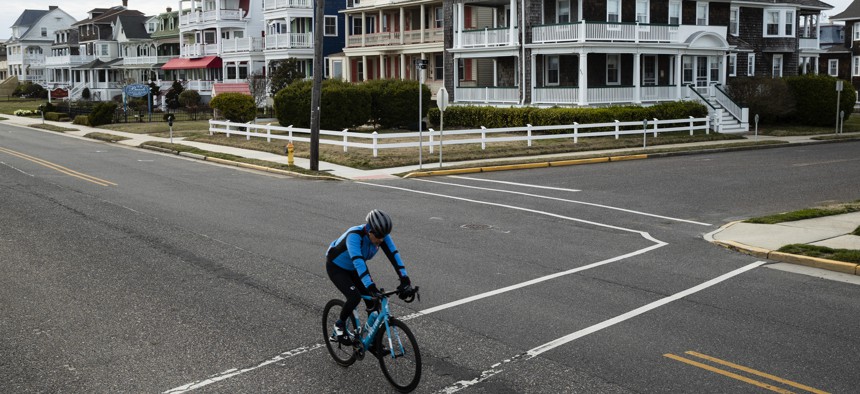Tourist Towns Ban Short-Term Rentals to Prevent Virus Spread

A cyclist rides a bicyle in Cape May, N.J., Wednesday, March 18, 2020.Some people who live in cities or their suburbs have been fleeing to their second homes at the shore to ride out the coronavirus near the beach. AP Photo/Matt Rourke
Short-term rental listings have drawn ire from local officials for advertising homes as quarantine retreats.
Communities that once embraced tourism and short-term rentals are now trying to prohibit property owners from marketing their homes as quarantine retreats for people seeking to escape the coronavirus pandemic in larger cities.
Beachside towns and ski resorts alike have banned short-term rentals through Airbnb and other online platforms after some property owners began touting their homes and condos to people looking to ride out the coronavirus in a new locale. Some states have gone as far as blocking hotels from opening up rooms to anyone other than essential workers, such as health care employees.
In the beach community of Cape May County, New Jersey, local lawmakers voted last week to ban all hotels, motels, guest houses and other properties from renting to any transient or seasonal guests for the foreseeable future.
“We don’t need visitors at this time,” said Gerald Thornton, the director of the county’s Board of Chosen Freeholders. “The more we discourage people from traveling at this time it will help eliminate the spread of COVID-19. When we can ensure it is safe, I will be the first one to welcome tourists with open arms.”
In Taos, New Mexico, city officials have not adopted any new restrictions on short-term rentals. But they are cracking down on any rental properties that failed to obtain the proper permits to operate their business, according to the Taos News.
Town Manager Rick Bellis told the Taos News that the city was stepping up enforcement based on reports from residents about property owners renting units to out-of-state residents for large parties. The city is no longer issuing short-term rental permits, meaning if any property owner was not already registered, they would be unable to do so. Property owners found to be operating a short-term rental business without a license could be subject to a $500 fine.
Delaware, Pennsylvania and Florida are among the states that have temporarily banned short-term rentals. While the Delaware and Pennsylvania bans include rentals of homes, condos and hotels, the Florida order from Gov. Ron DeSantis allows hotels and timeshares to continue to rent rooms. Each of the states allows certain exceptions, including short-term rentals for health care workers.
To encourage people not to violate stay-at-home orders, Airbnb has allowed guests to cancel bookings and receive refunds. It also created a $250 million fund to pay property owners 25% of their typical rental fee for any cancellations on rentals through May 31.
An Airbnb spokesman said the company is “working with local governments in realtime to both address these orders and ensure short-term and longer-term rentals are an available resource for frontline responders and those sheltering in place during this crisis.”
Lawmakers hoping to discourage travel to stop the spread of Covid-19, the illness caused by the novel coronavirus, have raised concern about short-term rentals being used for large parties or marketed to as a way for those seeking a way to flee large cities with high infection rates.
In Pennsylvania, which has temporarily banned short-term rentals, state Sen. Mario Scavello asked residents to report any online advertisements inviting people to vacation in the Pocono Mountains.
"If you receive information for anyone that is encouraging people to travel from the tri-state area and go against the governor's order to stay home, beware, if you don't take those ads down, I will report to the state police,” Scavello said. “You are telling people to break the law.”
Over the weekend, in Columbus, Ohio, authorities broke up two large parties being held at Airbnb rental homes. The state’s stay-at-home order, which is in effect through May 1, lists hotels and motels as essential services but prohibits gatherings of more than 10 people.
OTHER STORIES on Route Fifty:
Andrea Noble is a staff correspondent with Route Fifty.
NEXT STORY: States Announce Regional Efforts to Restart the Economy





